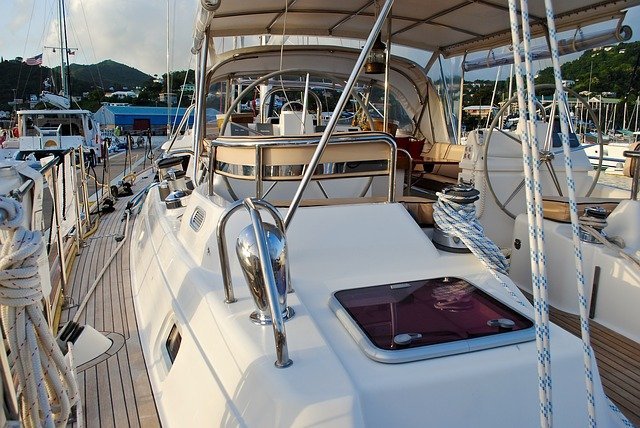Are Houseboats Safe When Lightning Strikes?
Lightning will be a hazard depending on where you park or sail your houseboat throughout the year and how often you use it.
Boats tethered in Florida, for example, are far more likely than those moored in California to be struck by lightning, but the odds of your boat being struck by lightning are still around one in every thousand.
In the event of a storm, whether you are moored at the marina or out on the water, it is important to be safe and aware about the possible risks that come with owning a watercraft.
Is it safe to be on a houseboat when lightning strikes?
In the unlikely event that your boat is hit by lightning, the odds are one in 1,000. In contrast, lightning may do significant damage, including injury to people who are in contact with metal or in the line of the lightning strike when the lightning bolt strikes. Lighting damage to the hull may result in leaks and possibly the loss of a ship as a consequence of the storm.
Are Houseboats Safe When Lightning Strikes?

How Does Lightning Affect a Houseboat in a Typical Situation?
In the event that lightning hits a boat, the energy is trying to find a way to reach the water.
Because sailboats have a lofty mast that functions as a lightning rod, it is far more usual for them to be hit by lightning.
However, wood and carbon fiber may be harmed or even explode when they come into touch with lightning. Aluminum is one of the elements that conducts lightning swiftly to the water.
Besides which, the electric currents generated by lightning may cause damage to your boat’s TV antennae, radar equipment, wind instruments, navigation devices, and lighting systems.
Lightning will finally choose the route of least resistance, which is generally metal or a strong conductor of electricity.
Avoid touching any metals or conductors that might assist lightning in traveling into your body in the event that lightning hits your boat. If you are on a boat and lightning strikes, keep away from the metals and conductors that could assist lightning in traveling into your body.
Aftereffects: If your boat has been hit by lightning, it is probable that it may sustain long-term, if not permanent, damage.
Lightning has been seen to travel through a boat’s hull and blast a hole in the bottom of the hull, despite the fact that it is generally regarded a myth. If you don’t take precautions, this might result in a leak that can eventually cause your boat to sink.
Furthermore, if lightning gains access to your boat’s control or electrical systems, it may completely demolish them.
In the end, if you aren’t attentive, you may discover that there are minor damages caused by a lightning strike, such as fried wiring or damaged light bulbs, that might cause injury or other harm if you aren’t careful.
As soon as you get confirmation that the storm has passed, inspect the boat for any damage.
Lightning strikes houseboats on a regular basis, right?
The majority of the time, lightning will hit a boat.
When there is a storm, the odds of being hit by lightning are one in a thousand, as previously stated.
The location where you dock your boat, the materials from which it is constructed, and the kind of vessel on which you are living may all help to boost the likelihood of success.
When living aboard a boat, it’s necessary to remember the following:
It is no secret that certain sections of the earth are more susceptible to severe storms than others, and where you moor is one of those places.
For this reason, you must exercise caution while selecting a location to dock your boat.
Living off the coast of Miami, for example, may provide greater scenery, excellent culture, delicious cuisine, and sunny weather, but it may also bring with it hurricane season and severe thunderstorms.
While living on a houseboat off the coast of Alaska, you are more likely to be hit by lightning than you are to get stranded in the snow and ice, which makes for a safer environment.
Even though it may sound too basic to state, anchoring your boat in an area where there are several storms each year can greatly enhance your chances of being hit by lightning.
It doesn’t matter what material your boat is made of, lightning will still hit it at some point. However, if lightning strikes a certain material, the consequences of the impact may be disastrous to you and your boat.
Because metals transmit lightning more rapidly and straight into your boat, as we previously said, they pose a greater risk. Those who come in contact with the same metal at the moment of the impact may suffer harm to their devices and even their bodies.
Due to the inability of wooden or carbon fiber boats to conduct electricity well when struck, they might get twisted or bent, or they can even catch fire as a result of the collision.
Depending on the material your boat is composed of, the probability that you may experience damage will be increased in such case.
Depending on the kind of boat you possess, you are far more likely to get hit by lightning than if you own a flat ship such as an inflatable bass boat.
There is a risk that your boat may be hit by lightning, and this will depend on the kind of boat you have.
It is possible that you will feel a bit better in a lightning storm if you live on an ordinary houseboat with no fancy masts or projecting things than someone who lives on a sailboat.
Again, though, being hit by lightning is still very unusual.
In the event of a lightning storm, should you leave your boat behind?
The fact that you live aboard a boat makes it somewhat more difficult to abandon ship under bad weather conditions.
Even if you live in an area that is more prone to severe storms and catastrophic weather, you may not be able to simply leave your house every time it seems that the weather is about to become bad.
As a result, the decision to abandon the boat for the night and wait for the storm to pass is entirely up to the boat owner – particularly if the boat is already securely tied at the port.
It must be noted, however, that each circumstance is different. In the event of a storm, EXIT. Considering staying in a hotel for the night if there is a particularly threatening electric storm.
Assuming, however, that you are just experiencing an infrequent thundershower, you should be able to remain down at the docks if it is more comfortable for you to do so.
Now, if you are out on the boat or a long distance away from shore and are unable to escape, it is strongly suggested that you remain in your cabin and away from metal or electrical gadgets during a storm to avoid injury.
If you have a houseboat and it is struck by lightning, what do you do with it?
When it comes to deciding what to do with your houseboat during a lightning storm, preparation, training, and your location during the storm are all important considerations.
While out on the water, dealing with a storm will be far more difficult than if you were docked in a harbor or cove with tall trees around you.
Consider the following steps, which you should follow depending on where your yacht is docked:
At Sea: It is strongly recommended that you go for shore immediately in the case of a lightning storm and make your way to the port.
If you’re out on the water and utilizing the correct tools, such as a barometer and a hygrometer to monitor humidity, you may be able to detect the approaching of a storm long before it really arrives.
When traveling over open sea, storms, on the other hand, travel at breakneck speed and may cover enormous distances in a short period of time.
To avoid being stranded on an island, always go towards shore.
For additional peace of mind, if you live aboard your boat full time and dock offshore at night, consider having land within sight and within easy reach in case of any difficulties that may arise – even if they are not linked to a hurricane.
Even if you are able to reach land, it is critical that you stay away from any metal or electrical equipment. It is recommended that you remain in your accommodation rather than going out on deck of the ship.
Finally, after the storm has passed, attempt to evaluate any damage and ensure that you have the capacity to transmit a distress signal if the ship is so seriously damaged that it is at risk of sinking or that you are unable to contact for assistance.
If your boat is moored at the marina, you basically only have two choices when it comes to what you should do next with it.
Pulling a huge yacht out of the marina is quite difficult and may be highly costly. A small boat can be towed away for free.
Due to the fact that storms are quite prevalent on the ocean and in regions such as Florida or the Gulf Coast, it is not always possible to flee when a storm comes.
After that, you’ll have to make a decision on whether or not you’ll remain aboard the boat throughout the storm.
Furthermore, whether you are planning to remain on board for the night or not, it is critical to remove any lightning attractants from the boat, such as umbrellas, fishing poles, or anything else composed of metal that may protrude from the boat.
What is the best way to protect a houseboat from lightning?
If you want to keep your houseboat safe from lightning, you must eliminate everything that might attract the lightning bolt.
Most likely, if you live aboard a sailboat, there is little you can do to prevent the mast from falling down.
In contrast, if you have anything metal or tall projecting from your boat that might attract lightning, remove it or put it below decks. This includes radio antennas, fishing poles, and any other gadgets.
A contemporary lightning protection device, such as grounding plates or side flash and equalization conductors, should also be installed to ensure that your property is protected from lightning.
They have not been shown to constantly protect you from lightning strikes or even prevent them, but it is thought they may assist reduce the amount of damage caused by a strike should one take place.
To summarize, remember that no amount of planning will completely protect you from a lightning strike or prevent any harm from happening. As a result, it is important to do all in your power, but ultimately, you will only be able to hope for the best outcome.




